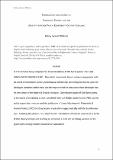Thomas Gray and the Goths: philology, poetry, and the uses of the Norse past in eighteenth-century England
Abstract
In 1761 Thomas Gray composed two loose translations of Old Norse poems: The Fatal Sisters and The Descent of Odin. This article reconstructs Gray’s complex engagement with the world of seventeenth-century Scandinavian scholarship: recovering the texts he used, the ideologies contained within them, and the ways in which he naturalized those ideologies into his own vision of the history of English literature. Gray became aware of Old Norse poetry in the course of composing a never-completed history of English poetry in the 1750s, but this article argues that it was not until the publication of James Macpherson’s Fragments of Ancient Poetry (1760) that Gray became inspired to engage poetically with the Scandinavian past. Imitating Macpherson, he created his own ‘translations’ of what he understood to be the British literary heritage and, in doing so, composed a vivid and surprising variation on the grand myths of early modern Scandinavian nationalism.
Citation
Williams , K J 2014 , ' Thomas Gray and the Goths: philology, poetry, and the uses of the Norse past in eighteenth-century England ' , Review of English Studies , vol. 65 , no. 271 , pp. 694-710 . https://doi.org/10.1093/res/hgu024
Publication
Review of English Studies
Status
Peer reviewed
ISSN
0034-6551Type
Journal article
Collections
Items in the St Andrews Research Repository are protected by copyright, with all rights reserved, unless otherwise indicated.

